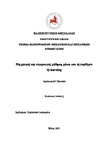| dc.creator | Siouras A., Moustakidis S., Giannakidis A., Chalatsis G., Liampas I., Vlychou M., Hantes M., Tasoulis S., Tsaopoulos D. | en |
| dc.date.accessioned | 2023-01-31T09:57:03Z | |
| dc.date.available | 2023-01-31T09:57:03Z | |
| dc.date.issued | 2022 | |
| dc.identifier | 10.3390/diagnostics12020537 | |
| dc.identifier.issn | 20754418 | |
| dc.identifier.uri | http://hdl.handle.net/11615/79047 | |
| dc.description.abstract | The improved treatment of knee injuries critically relies on having an accurate and costeffective detection. In recent years, deep-learning-based approaches have monopolized knee injury detection in MRI studies. The aim of this paper is to present the findings of a systematic literature review of knee (anterior cruciate ligament, meniscus, and cartilage) injury detection papers using deep learning. The systematic review was carried out following the PRISMA guidelines on several databases, including PubMed, Cochrane Library, EMBASE, and Google Scholar. Appropriate metrics were chosen to interpret the results. The prediction accuracy of the deep-learning models for the identification of knee injuries ranged from 72.5–100%. Deep learning has the potential to act at par with human-level performance in decision-making tasks related to the MRI-based diagnosis of knee injuries. The limitations of the present deep-learning approaches include data imbalance, model generalizability across different centers, verification bias, lack of related classification studies with more than two classes, and ground-truth subjectivity. There are several possible avenues of further exploration of deep learning for improving MRI-based knee injury diagnosis. Explainability and lightweightness of the deployed deep-learning systems are expected to become crucial enablers for their widespread use in clinical practice. © 2022 by the authors. Licensee MDPI, Basel, Switzerland. | en |
| dc.language.iso | en | en |
| dc.source | Diagnostics | en |
| dc.source.uri | https://www.scopus.com/inward/record.uri?eid=2-s2.0-85125345588&doi=10.3390%2fdiagnostics12020537&partnerID=40&md5=8275cf533a8263f7e053b0880dab7c77 | |
| dc.subject | algorithm | en |
| dc.subject | anterior cruciate ligament | en |
| dc.subject | artificial neural network | en |
| dc.subject | cartilage | en |
| dc.subject | cartilage injury | en |
| dc.subject | convolutional neural network | en |
| dc.subject | decision making task | en |
| dc.subject | deep learning | en |
| dc.subject | human | en |
| dc.subject | image segmentation | en |
| dc.subject | knee injury | en |
| dc.subject | knee meniscus | en |
| dc.subject | learning algorithm | en |
| dc.subject | machine learning | en |
| dc.subject | natural language processing | en |
| dc.subject | nuclear magnetic resonance imaging | en |
| dc.subject | posterior cruciate ligament | en |
| dc.subject | prediction | en |
| dc.subject | Review | en |
| dc.subject | support vector machine | en |
| dc.subject | systematic review | en |
| dc.subject | training | en |
| dc.subject | transfer of learning | en |
| dc.subject | validation process | en |
| dc.subject | MDPI | en |
| dc.title | Knee Injury Detection Using Deep Learning on MRI Studies: A Systematic Review | en |
| dc.type | other | en |

